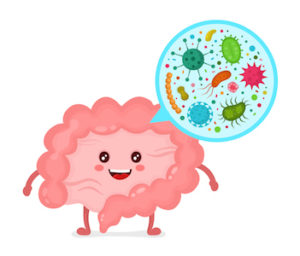Doctors’ Notes
BackProbiotics
Did you know that we all have “good bacteria” inside us?
The “normal” bacteria in our digestive system help us to break down our food into basic nutrients that our body absorbs. Sometimes the good bacteria can be altered or washed out due to certain GI diseases, infections, and even antibiotic use. In some cases, it may be beneficial to help our body replace some of the good bacteria that has been lost due to illness or medication use.

A probiotic is an oral supplement (available as powder, chewables, or drops) or food product (most commonly yogurt) that contains the good bacteria that can help “replace” what has been flushed out. The most commonly used strains or types of probiotics used are lactobacilli and bifidobacteria.
Research is ongoing to determine the most effective use of probiotics for specific GI symptoms. Recommendations for use can vary based on the amount and type of bacteria in each probiotic product.
We have seen probiotics be clinically useful in limiting the growth of “bad bacteria” in the gut, improving the strength and immune response of the intestines, and even helping with abdominal discomfort.
What Illnesses Do Probiotics Help?
Diarrhea
Probiotics may help shorten the duration of diarrhea. According to a January 2018 article in Pediatric News, probiotics are not associated with any adverse effects. The research cited in the article supports the idea that probiotics can help shorten the duration of diarrhea.
In this case, probiotics help to restore the normal bacteria to the digestive system to help decrease symptoms. A study from 2010 found that probiotics can potentially reduce diarrhea symptoms by up to 25 hours. As parents know, shortening an illness or symptoms by even one day can make a world a difference for a child (and the rest of the family).
Infantile Colic
Some studies suggest that probiotics are associated with decreased crying time in babies with colic. The best result noted with probiotics has been from Lactobacillus, especially in breastfed babies.
Colic can be stressful on both parents and baby, and probiotics are a viable option to attempt to cut back on colic symptoms. Depending on your child’s history and health status, probiotics may be able to be used on a trial basis. You can talk with your doctor about whether probiotics are worth trying.
Where Can I Get Probiotics?
Probiotics are available over-the-counter in formulations for infants, children, and adults. As noted above, they come in the form of drops, chewable tablets, or flavorless powders that mix well into liquids. They can be found in the pharmacy aisle at most stores.
If you have questions about the potential benefit of probiotics for your child’s belly, just discuss them at your next visit with a Kids Plus Provider!
Samantha Angelo, PA, has been a Kids Plus Provider since 2016.
Taylor Murphy spent a rotation at Kids Plus as a PA Student from Slippery Rock University.